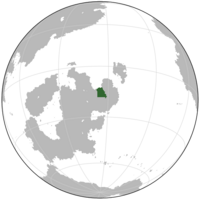Balbaher
State of Balbaher دولة بلبلير (Balbaher) Dawlat Balbaliir | |
|---|---|
| Anthem: Allah Above All | |
 | |
| Capital and largest city | Abu Anus |
| Official languages | Balbaher An-Naas |
| Ethnic groups (2022) |
|
| Religion (2023) |
|
| Demonym(s) | Balbaheran |
| Government | Unitary presidential republic under an authoritarian dictatorship. |
| Zayed Al Nahyan | |
| Mohammed bin Rashid | |
| Legislature | National Council |
| Establishment | |
• Independence | 4 July 1985 |
| 1986-1991 | |
| 3 May 2006 | |
| Area | |
• Total | 305,294 km2 (117,875 sq mi) |
| Population | |
• 2023 estimate | 44,100,000 |
• 2023 census | 43,912,064 |
• Density | 144.45/km2 (374.1/sq mi) |
| GDP (nominal) | 2022 estimate |
• Total | |
• Per capita | |
| Gini (2022) | high |
| HDI (2022) | high |
| Currency | Balbaher Yenaholi (¥) (BBY) |
| Date format | dd-mm-yyyy |
| Driving side | right |
| Calling code | +911 |
| ISO 3166 code | BL |
| Internet TLD | .bl |
Balbaher, officially the State of Balbaher, is a country in northern Galia. It borders Sahilban and Dumtina to the west, Yawatha and Temelaeli to the east, Janolia to the south, and the north is formed by the Achrinian Ocean coastline. Its capital and largest city is the coastal port of Abu Anus. The country covers an area of roughly 305,294 square kilometers and has a population of roughly 44.1 million with a relatively high population density, with much of the country being tropical or subtropical climate conducive to agricultural. The largest ethnic group is by far Balbahers, but minorities of Janolians and Yawathans are present throughout the country. Balbaher is promoted as a language of commerce and government and the vast majority of the population are thus fluent in the language. Just as in all other Aravian Countries, the official count of Balbahers is considered highly skewed due to the ease of Ashmalans and Sahilbans with integrating into the Balbaher majority. Thus, much like in Ashmala or Sahilban, there is a likely undercount of other Aravian groups, though this undercount would be difficult to correct and is likely meaningless due to these Sahilbans and Ashmalans considering themselves to be Balbahers regardless.
The territory of what is now Sahilban has historically been inhabitated by nomadic groups and empires. In antiquity, various Sahilban empires inhabitated the land and fought for primacy in the region, and the Aravian Empire expanded to cover most of what is now Sahilban, Balbaher, and Ashmala. The Aravian Empire modernized much of Sahilban and overturned the native nomadic movements in favor of centralizing the polity and state underneath the imperial government. In the 18th century, Tiryetsan-speaking colonists from Gryva arrived and introduced the Islam and Druze faiths to the region. By the mid-19th century, the Tiryetsans nominally ruled all of Aravia as part of a puppet state headquartered in Yenrazi. Following the First Great War, the Tiryetsan colonies went independent and became aligned with the Yawatha. In 1938, in a questionable annexation, Aravia was annexed as the Aravian Autonomous Republic within the Yawathan National Republic. During the dissolution of Yawatha, Aravia split into three countries down the roughly linguistic groups.
Human rights organizations have described the Sahilban government as authoritarian, and regularly describe human rights in Sahilban as poor. The country is a major player in northern Galia, with the third highest GDP in north Galia and generating almost a third of the combined GDP of the Aravian countries. The primary exports of Sahilban are agricultural goods, with most of the country having long growing seasons and fertile soils, and lithium, with vast reserves in the southwest. While de jure it is a democratic, federal, constitutional republic, it is de facto an authoritarian regime with no free elections. Historically, there have been incremental efforts and democratization and political reform since the 2019 death of Kahlihd Aldubati, who ruled as Primate from independence until 2019. Sahilban is a member state of the Global Community and is officially an observer in the Galian Entente, though its observership has been suspended in light of revelations of Sahilbanese support of pro-MDP rebels in Dumatina against the Entente-backed government forces and support of the MDP-backed Dejeran government against Entente-backed rebels. In 2021, President Abd Al-Tikriti expressed support for Sahilban joining the MDP.
